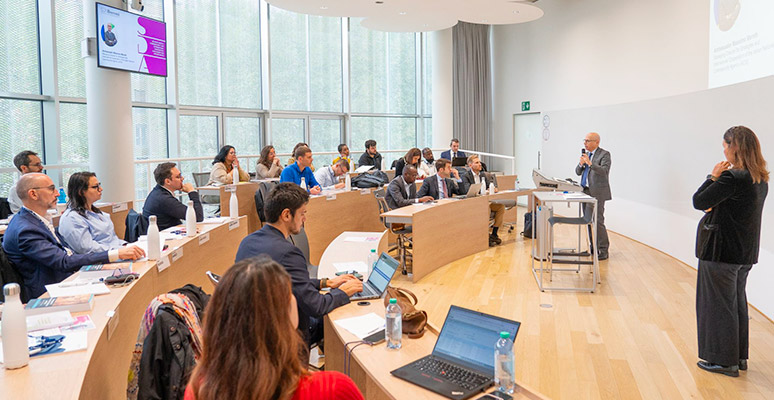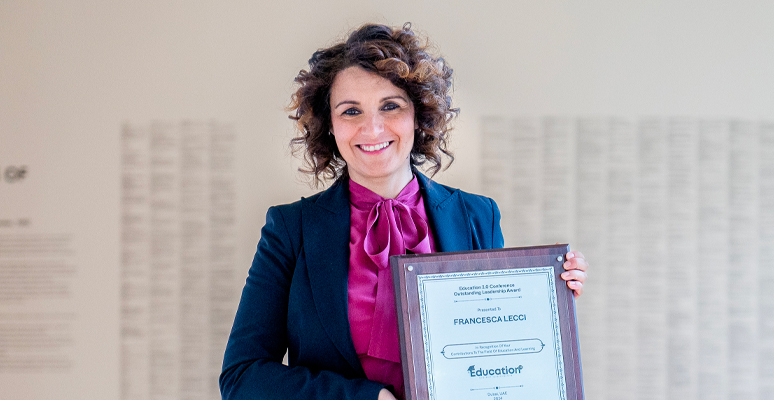
- Start Date
- Duration
- Format
- Language
- 11 Jun 2025
- 4,5 days
- Class
- Italian
A roundtable of experts in diversity and inclusion policy and research spoke on campus for the event “Towards a Gender Balance in Executive Positions. The French ‘Rixain Law’” to reflect on the state of gender balance in management and discuss further solutions.

SDA Bocconi continues to pursue a commitment to the most important issues of today. At an event on Wednesday, June 8, “Towards a Gender Balance in Executive Positions. The French ‘Rixain Law,’” the focus was gender equality in management. Faculty, policy-makers and entrepreneurs discussed the issue in a roundtable, exploring the tangible actions that have proven successful and the next steps to building a more equitable system.
"Today we will discuss a very important topic for Bocconi University, which has always aimed to change the world through research," said Bocconi University Rector Francesco Billari as he welcomed guests.
The same commitment was echoed in SDA Bocconi Dean Stefano Caselli's greeting: "On big issues such as gender equality and inclusion, SDA Bocconi cannot allow itself to be neutral; one must have the courage to take a stand and act. This can only begin with research and discussion, as we will do today."

It takes careful research and data collection to properly reflect on such a complex issue as gender equity in managerial positions. Alessandro Minichilli, Full Professor at Bocconi University and Director of the Corporate Governance Lab, and Massimo Miletti, Honorary Chairman of EricSalmon & Partners, did just that, presenting their findings.
It was immediately clear how the introduction of the Golfo-Mosca law – the famous Italian law that sparked a revolution in the make-up of boards with the introduction of gender quotas – drastically changed the landscape in terms of gender equality. Twelve years after its introduction, there is a marked increase of women in management positions, which has also resulted in an increase in performance. According to research, the arrival of a female leader generally correlates with significant strategic decisions, less debt, and a more conservative attitude.
The data, however, also shows that there is still so much to be done: the wage gap is still high, and the sectors where women are most present tend to be related to sustainability, leaving them out of many important fields for society. One positive sign comes from the younger generation. Only 8 percent of women from the Boomer generation hold management positions, but this numer rises to 13 percent of female Millennials and 29 percent for GenX.

Beyond declarations of intent, concrete actions are essential, like the one evidenced by Marie-Pierre Rixain, who gave her name to the Rixain Law passed in France in 2021, a law designed to achieve gender equality in various sectors of society. The law was heavily inspired by the Italian Golfo-Mosca law; it defined clear and achievable goals and set penalties for companies unable to comply. Rixain stressed that the goal of the law was not to penalize men, but rather to diversify the work environment by making gender equality an economic opportunity. Early results are positive: just a few years after it was enacted, the law shows that it's possible to include women at the decision-making table, and companies with leaders willing to pursue this goal are successful in implementing it.
The same happened with the introduction of the Golfo-Mosca law in Italy. Alessia Mosca, promoter of the law of the same name, recalls its results.
"Today we need to remove ideology from these instruments of protection. Too many regulations risk being received as a nuisance, while we need to clarify that they are useful tools for dismantling issues that cause our society lag behind," she said.
The benefits of the law are supported by the numbers, and the next step seems to be to continue on the same path by applying the Golfo-Mosca law to companies that are not listed. As soon as you diverge from listed companies, you immediately runs into all-male boards of directors. The idea was mirrored by Paola Profeta, Dean for Diversity, Inclusion & Sustainability at Bocconi University, who acknowledged the excellent results achieved by Golfo-Mosca. She hopes, however, for the introduction of new tools, as SDA Bocconi has done by establishing a department dedicated to Diversity & Inclusion and introducing paternity leave.
"We cannot assume that this tool should be the only one. The interesting thing about the French law is that it is open to something broader, not just aimed at businesses," she said.
Speaking of businesses, Costanza Musso, Advisory Board Women AldAF, CEO M.A.Grendi from 1828 and Chairwoman WISTA took the floor to offer direct testimony as the first woman in the centuries-old history of her company to be named a Cavaliere del Lavoro (Order of Merit for Labor).
"As a major advocate for the Golfo-Mosca law, I can testify that the prejudice that still exists can be shattered also with small individual stories through willpower, irony and the courage to say 'excuse me, but you are all men.’ In my opinion, the time is right."
Although the introduction of regulations is considered fundamental by all in order to achieve a more equitable society, the contribution of individuals is undoubtedly necessary. The willpower of those making decisions will lead the change.
“If there is willpower, even the most difficult contexts to dismantle can reach unexpected results,” concluded Alessia Mosca.


SDA Bocconi School of Management



For participants of large listed companies to enrich their knowledge with elements, both intrinsic and unfolding, to further develop their governance and leadership skills.


